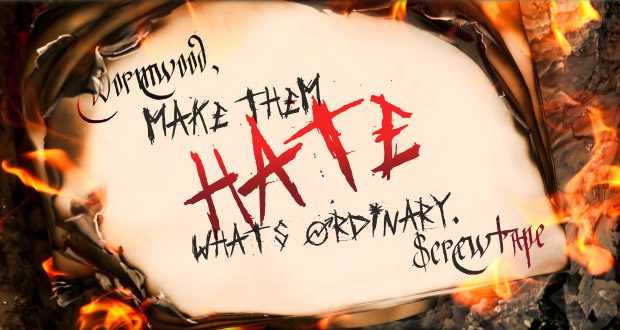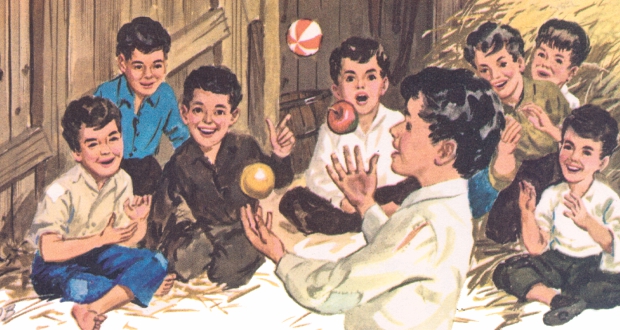Dr. Mitchell Kalpakgian
March 20, 2014
7,830 Views
by Mitchell Kalpakgian | The French phrase “déjà vu” (already seen) carries a negative connotation. If something is déjà vu, it means that one has done something, been someplace, or had an experience that he does not want to repeat, revisit, or undergo again.
Read More »
Dr. Mitchell Kalpakgian
March 13, 2014
8,062 Views
by Mitchell Kalpakgian | In the “Preface” to The Great Divorce C. S. Lewis explains the nature of moral error in the modern world as an endless progression on the wrong road-- the assumption that all roads sooner or later lead to the same destination.
Read More »
Dr. Mitchell Kalpakgian
March 8, 2014
8,669 Views
by Dr Kalpakgian | By giving Curdie “some” of the truth Irene led him to “all” of it. By giving Curdie time and being content to be misunderstood for a short period, Irene led her friend to the fullness of the truth. To be a messenger like Irene is to speak the simple truth and let God do the rest.
Read More »
Dr. Mitchell Kalpakgian
February 25, 2014
7,107 Views
by Mitchell Kalpakgian | According to Chauntecleer, books are the final authority of truth. Pertelote, who stays below in the farmyard, views the subject of dreams exclusively in terms of personal experience. Never in her life does she remember a dream that came true.
Read More »
Dr. Mitchell Kalpakgian
February 18, 2014
9,557 Views
by Mitchell Kalpakgian | Listening to the talk shows on television every night, watching athletic events all day Saturday and Sunday, and spending hours on the Internet do not organize the day, deserve priority, or require the discipline of will power. They do not breathe life, nourish the mind, or lift the soul. A person does not need more time to do these essential things but a greater desire to do first things first.
Read More »
Dr. Mitchell Kalpakgian
February 13, 2014
9,010 Views
by Mitchell Kalpakgian | The whole episode made no sense to him, and he was at a loss for some possible explanation for his great frustration. The only comfort his mind offers is the knowledge that the accident was not a great tragedy. He acknowledges with gratitude the escape from other “torments and evils to which even this wasted wine would have seemed a wretched jest.”
Read More »
Dr. Mitchell Kalpakgian
February 6, 2014
8,465 Views
So often in human life we wonder if someone is going to call, coming to visit, or going to write us a letter. We assume that we are to expect, ...
Read More »
Dr. Mitchell Kalpakgian
January 30, 2014
8,271 Views
How easy it is to neglect these amenities of manners that consist of attention to seemingly minor things of no consequence: a thank you note, a compliment, a visit. How convenient it is to use the excuse of busyness with important affairs to avoid attention to small details.
Read More »
Dr. Mitchell Kalpakgian
January 23, 2014
18,343 Views
In C. S. Lewis’s The Screwtape Letters, Uncle Screwtape, the master devil, counsels his junior apprentice, Wormwood, to use tried and true techniques to seduce souls into sin. One tactic he highly recommends is the strategy that perverts man’s natural love of change:
Read More »
Dr. Mitchell Kalpakgian
January 16, 2014
7,571 Views
Contemplation is a form of looking inspired by wonder that moves a person to continue looking at a great work of art or to remain thinking about a great idea, divine miracle, or mystery.There is so much to see or know that one lingers to see more and to think more deeply.
Read More »
Dr. Mitchell Kalpakgian
January 9, 2014
7,103 Views
This great design of awaiting the next pleasure forms the master plan of life designed by a wise Creator who orients man toward the future with hope. No one ever truly wants to return to the past or dreams of recovering the fountain of youth.
Read More »
Dr. Mitchell Kalpakgian
January 2, 2014
8,850 Views
Words, like music, can create harmony or discord. Words, like certain fine instruments, can refine and beautify or, like blunt tools, can break and smash. The art of living requires sensitivity to the choice of words, to the tone of voice, and to the manner of speech.
Read More »
Dr. Mitchell Kalpakgian
December 26, 2013
6,505 Views
Of course civility dictates that a person strive to make a good appearance that befits the occasion in an honest expression of who he or she is, and the person in the role of judge must take into consideration the fact that a first impression may be insufficient grounds for a correct interpretation.
Read More »
Dr. Mitchell Kalpakgian
December 19, 2013
8,336 Views
It is possible to take many things too seriously. Coaches and athletes can take winning too seriously (It’s only a game). The avaricious and the miserly who worship gold take money too seriously (It’s only metal or paper). Politicians can take elections and political power too seriously (They are not the salvation of the world). Scholars can take learning too seriously and presume that man is god and that human knowledge supersedes divine wisdom (“Even though a wise man claims to know, he cannot find it out,” Solomon states in Ecclesiastes).
Read More »
Dr. Mitchell Kalpakgian
December 12, 2013
11,570 Views
Members of a family know each other too well to be fooled by brother’s daydream to be a millionaire, sister’s fantasy to be a great actress, or grandson’s ambition to be a professional athlete. The family teaches humility, self-knowledge, the art of the possible, and the way things are.
Read More »
Dr. Mitchell Kalpakgian
December 5, 2013
8,632 Views
In Robert Frost’s famous poem “The Road Not Taken,” a traveler recalls a moment in his life when he reached a crossroads. He comes to a turning point on the journey and pauses to consider which path to follow. Both roads have fair prospects and great allure.
Read More »
Dr. Mitchell Kalpakgian
November 28, 2013
6,961 Views
In Kenneth Graham’s The Wind in the Willows Mr. Toad, the owner of Toad Mansion and the great traveler on the Open Road who is always on a new vehicle going to faraway places, cannot comprehend how Mr. Rat can find contentment in a simple cottage on the river where he dwells all year and never explores the wider world of new sights and foreign lands: “You surely don’t mean to stick to your dull fusty river all your life, and just live in a hole in a bank, and boat. I want to show you the world.”
Read More »
Dr. Mitchell Kalpakgian
November 21, 2013
12,468 Views
While it is a most human to desire the ideal, seek the best, and have the highest goals, all human lives suffer damages and require rebuilding. The unfaithful husband or wife, the deaths and illnesses in a family, the rebellion of the prodigal son or daughter, the loss of income or work all inflict destruction of some kind that forces another beginning, a fresh approach, a new idea, or the exercise of a heroic virtue.
Read More »
Dr. Mitchell Kalpakgian
November 14, 2013
7,338 Views
As the freshness of childhood and the exuberance of youth fade, and life assumes a regularity and familiarity, it is all too easy to become jaded and blasé. Instead of ...
Read More »
Dr. Mitchell Kalpakgian
November 7, 2013
8,834 Views
While everyone has heard of King Midas’s avarice and his desire for The Golden Touch that transforms everything he touches into gold, not everyone has heard of The Leaden Touch. In Hawthorne’s A Wonder Book one of the children who hears of the famous story about King Midas, remarks, “But some people have what we may call ‘The Leaden Touch,’ and make everything dull and heavy that they lay their fingers upon.”
Read More »


 Seton Magazine Catholic Homeschool Articles, Advice & Resources
Seton Magazine Catholic Homeschool Articles, Advice & Resources


















